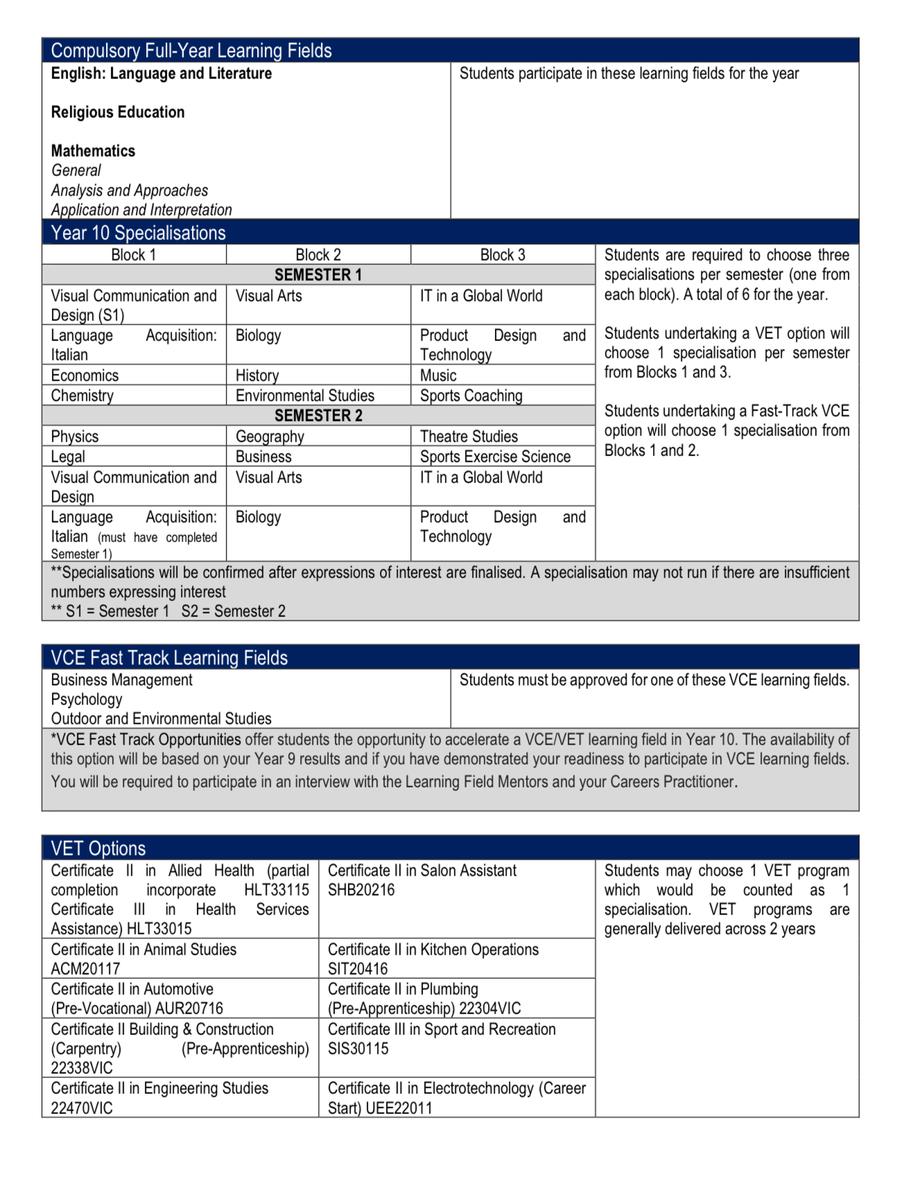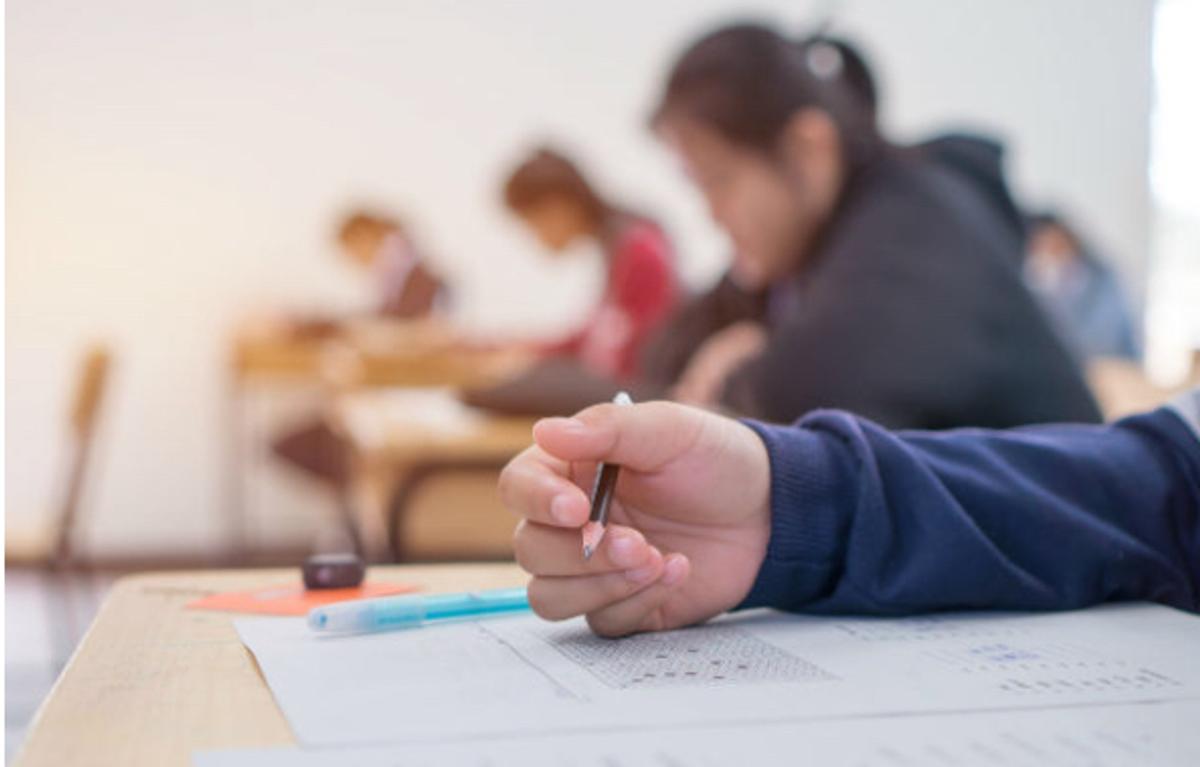Year 10 program

The 2022 School of Possibilities Year 10 Student Handbook is an important part of the course planning and learning field selection process. It is designed to inform students and parents about the requirements of studying Year 10 at St Anne’s College and to provide an overview of the compulsory learning fields and specialisations that are available. The learning field and specialisation selection process also includes student and parent information sessions, course guidance and formal interviews. As each individual student must ultimately feel confident with their choices, it is advisable that students and parents read through the handbook carefully.
As a student, when making choices, you should first consider your preferred learning style and skill set. You need to consider if you are:
1. An Auditory Learner - Auditory learners are most effective when they receive information out loud.
2. A Visual Learner - If you are a visual learner, you are possibly self-directed in your learning and pretty good at problem solving.
3. A Kinaesthetic Learner - You like to use your hands, you need to participate in practical learning activities with real-life outcomes.
4. A learner who has strength as a communicator, a collaborator, a thinker, a self-manager or a researcher.
In addition to considering skills, interests and talents, you need to reflect on the learning areas you have liked and performed well in in the past. To help you make informed decisions about your personal learning program, you are encouraged to access the range of information, resources and support available to you. Students should start by discussing their plans with parents/carers, their Pastoral Group Leader, Learning Mentors and the Careers Practitioner. As a student, you should ask questions, actively seek information from people who can advise and guide you and also attend learning field and specialisation selection evenings and meet with your Careers Practitioner. (Dates to be confirmed).
Overview of Learning Fields and Specialisations in Year 10
Students are required to complete all compulsory core learning fields, including English, Maths and Religious Education and then select three specialisations per semester, which may include an accelerated VCE study (subject to approval) and/or Vocational Education and Training (VET) subject. This means that, whilst maintaining a broad general education, students are able to follow their own particular interests and also experience new areas. Depending on your choice, this can open a pathway to completion of a VCE Units 3 and 4 study sequence in Year 11.
Year 10 Learning Field Offerings: 2022
*VCE Fast Track Opportunities offer students the opportunity to accelerate a VCE/VET learning field in Year 10. The availability of this option will be based on your demonstrated readiness to participate in VCE learning fields through your results and work ethic in Year 9. You will be required to participate in an interview with the Learning Field Mentor and your Careers Practitioner.
Year 10 Curriculum
Year 10 Program Pathways
You are provided with two pathway options in Year 10; a standard Year 10 program or an opportunity to participate in a fast-track program. The standard Year 10 program provides you with a range of compulsory learning fields and specialisations over the school year. The design of specialisations provides you with an opportunity to investigate your areas of interest or passion, preparing you for a successful transition into your preferred Senior Secondary pathway. The standard Year 10 program can also include a Vocational Education and Training (VET) program.
The VCE fast-track program offers students the opportunity to accelerate a VCE/VCE VET learning field. This option appeals to students who have demonstrated a readiness to commence their VCE journey through the success of their Year 9 results. Students will need to be approved by the School Leader/Learning Field Mentor prior to enrolling into any fast-track program. Due to timetabling, students participating in the fast-track program will not be able to participate in a VET program as well.
Choosing a program and selecting learning fields
Think about your interests and career aspirations and link these with an appropriate program. Read the information about each of the Year 10 learning fields, including the fast-track and VET options, to get some ideas about how to select a program that is suited to you and provides options for Years 11 and 12. Discuss your thoughts and ideas with your parents/carers. Speak with your Careers Practitioner regarding prerequisite learning fields you may need for VCE learning fields that interest you. Discuss the learning fields you are considering with the Learning Field Mentor.
If you are interested in a VET program, research the learning fields covered in this program and identify career opportunities.
Exams
In Year 10, most learning fields will have an exam towards the end of Semester 1 and Semester 2 for an assessment. All exams are compulsory for all students. The exam mark contributes to the overall result for each learning field and is included on your Statement of Results. Exam dates for the year are published on the college calendar. If you are unable to attend any exam, the School Leader and Learning Field Mentor must be notified as soon as possible.
Year 10 Exam Timetable 2022
Semester 1: 20/06/2022 - 23/06/2022
Semester 2: 08/11/2022 - 10/11/2022
All students need to ensure that they are familiar with all requirements expected during exams.
General
The Year 10 exam timetable will be published in SIMON. Arrive at school early and ensure that you know the correct location of your exam room. The doors of the exam room will be opened 10 minutes before the starting time for the exam. You will not be allowed to leave the exam room until the end of the scheduled finishing time for each exam. Students must bring to the exams their own writing equipment, erasers, ruler, dictionary, correct calculator, etc. These must be carried and stored in a clear plastic pocket. Pencil cases and bags are not to be brought to the exam room. Students must not bring to the exams mobile phones or other types of music or electronic communication devices. Students may bring bottled water into an examination room with the following conditions:
- The water is in a clear plastic bottle (no label).
- The bottle has a secure lid.
- The capacity of the bottle is no more than 1500 ml.
- The water bottle must not be placed on the desk at any time.
- Water bottles must not be refilled during the examination.
- Water bottles must not be shared between students.
Please take particular note of the following rules:
During any exam you must not have in your possession any book or notes or blank paper (apart from the materials distributed for that exam) or any other resources that would improperly help you in your work. An exception applies to learning fields which allow the use of bound resources or notes during exams. During any examination you must not:
- talk to or signal to other students;
- have any electronic device (including mobile phones and electronic dictionaries) apart from calculators (if permitted);
- directly or indirectly help any other student or permit any other student to copy from or otherwise use your papers;
- directly or indirectly accept help from any other student or use any papers of any other student;
- behave in a manner that disrupts other students.
All students must remain seated until all completed exam papers have been collected by supervisors.
Use of Dictionaries
If you require the use of a dictionary in the exams you must provide your own. The use of dictionaries in exams is subject to the following conditions:
- A dictionary may not contain any additional material that may help you in the exam of the learning field concerned.
- The supervisor at the exam room has the authority to inspect your dictionary.
Use of Calculators
Students must use the school-approved scientific or CAS calculator in their exams, if permitted. Please ensure that you bring your own calculator and that you have a spare set of batteries for your CAS calculator. No batteries will be supplied during the exam.






